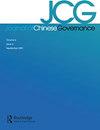Roles of institutions and dynamic capability in the relationship between collaboration and performance in emergency management: evidence from 110 cases in Shanghai
IF 3.7
3区 社会学
Q1 POLITICAL SCIENCE
引用次数: 3
Abstract
Abstract The existing research identifies that cross-organizational collaboration is important in the enhancement of emergency management. However, little effort has been made to empirically examine how collaboration contributes to emergency performance. Within this field lies a theoretical controversy that institutional arrangement and dynamic capability compete with each other to enhance emergency collaboration. Numerous studies find that a contingency plan, as a form of institutional arrangement, is necessary for ensuring collaboration in a planned and legitimate manner. Conversely, research also suggests that absorptive capacity, as an important dynamic capability for organizations to adapt to changing environments, is beneficial to the improvement of emergency collaboration. The current study contributes to the understanding of the influence of collaboration on emergency performance by (1) investigating the relationship between collaboration networks and performance, and (2) examining the mediating roles of the contingency plan and absorptive capacity in this relationship. Employing structural equation modeling with data from 110 cases of emergency drills in Shanghai, results suggest that collaboration networks have a positive association with emergency performance, which is simultaneously mediated by contingency plan and absorptive capacity, and further demonstrate that absorptive capacity exerts a stronger effect than contingency plan. Overall, the findings point to a need to dissolve the nuanced contradiction between the institutions and dynamic capability and weigh the two approaches when implementing emergency collaboration across organizations.机构和动态能力在应急管理协作与绩效关系中的作用——来自上海110例案例的证据
摘要现有研究表明,跨组织协作在加强应急管理方面很重要。然而,很少有人从经验上研究合作如何有助于应急绩效。在这一领域中,存在着制度安排和动态能力相互竞争以加强应急协作的理论争议。许多研究发现,应急计划作为一种制度安排,对于确保有计划和合法的合作是必要的。相反,研究还表明,吸收能力作为组织适应不断变化的环境的重要动态能力,有利于改善应急协作。本研究通过(1)调查协作网络与绩效之间的关系,以及(2)考察应急计划和吸收能力在这种关系中的中介作用,有助于理解协作对应急绩效的影响。采用结构方程模型,结合上海市110起应急演习的数据,结果表明,协作网络与应急绩效呈正相关,同时受应急计划和吸收能力的调节,并进一步证明吸收能力比应急计划发挥更大的作用。总的来说,研究结果表明,在实施跨组织的紧急合作时,需要消除机构和动态能力之间的微妙矛盾,并权衡这两种方法。
本文章由计算机程序翻译,如有差异,请以英文原文为准。
求助全文
约1分钟内获得全文
求助全文

 求助内容:
求助内容: 应助结果提醒方式:
应助结果提醒方式:


